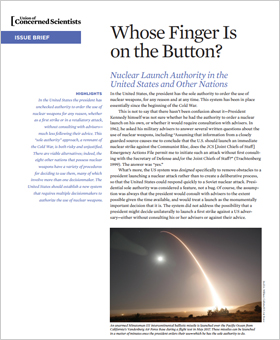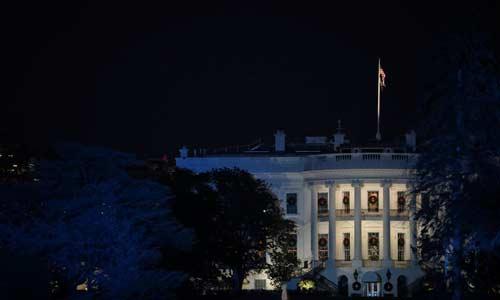The choice to use nuclear weapons is one of the most significant, impactful decisions that a leader or country could ever make. A single warhead or bomb could kill hundreds of thousands of people; the use of even a small number of weapons could cause dramatic and disastrous impacts.
In the United States, a single person is authorized to make the decision to use a nuclear weapon—the president. They are not required to consult with any advisors before issuing a launch order. No one in the Defense Department, Congress, or the judicial branch can lawfully prevent the use of nuclear weapons once the president’s order is given.
This system of control (known as “sole authority”) is not the only way to handle launch decisions. In fact, other nuclear states have adopted chains of command that are distinctly less risky than sole authority, and which may provide safer models for the United States to learn from.
- Britain: Although the prime minister would be the one to issue a launch order, the monarch is the formal commander-in-chief. If officials in the Ministry of Defence receive a launch order that they judge wrongful, they can lawfully appeal to the queen to overturn it. Parliament could also call for a vote of no confidence, which would require the prime minister’s immediate resignation.
- India and Pakistan have both established councils to authorize the use of nuclear weapons. In Pakistan, orders to launch require consensus among the council’s members, which was designed to imitate a board of directors.
- Israel: Although information on Israel’s nuclear policies is scarce, multiple experts have suggested that Israeli nuclear weapons aren’t controlled by a single person, but “subject[ed] to a system of tight civilian control.”
- China: Little is publicly known about China’s nuclear launch protocol. However, a 2004 Chinese military text, translated by the Union of Concerned Scientists, suggests that the Central Military Commission—or perhaps its chair alone—holds the authority to launch. The Commission’s 11 members are senior generals and senior party officials and its chair is China’s president. It’s also possible that recent reforms have changed this process.
- Russia: The president, defense minister, and chief of general staff all have access to the nuclear codes. It’s unclear whether all three are required to order a launch, but the system is designed to prevent a single person from issuing the launch command. Some experts also suggest that “there are additional hurdles (i.e., more people involved)” if Russia decides to use weapons first.
- France: As in the United States, the president alone can order a nuclear launch, though the chief of the presidential military staff and the chief of defence staff may also be involved.
In the United States, legislation proposed in 2017 would require a declaration of war by Congress before the president could order the first use of nuclear weapons. However, the president would still wield sole authority for retaliatory strikes, i.e., those made in response to a nuclear attack—a problem that must also be addressed.
Adopting either this or another system of checks and balances could help reduce the riskiness inherent in granting a sole person authority over the world’s most destructive weapons.




